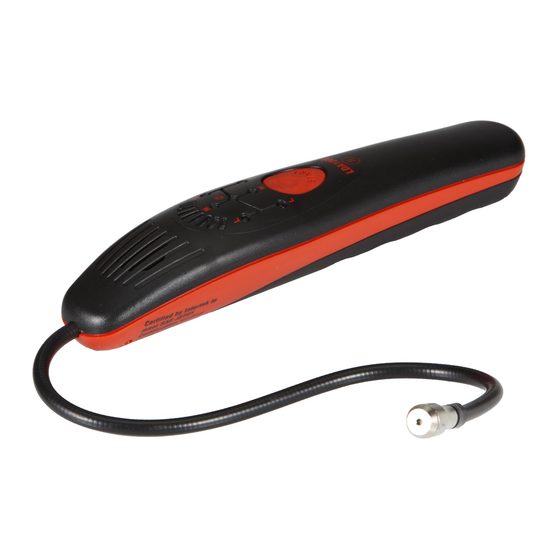CPS Pro-Set LDA1000H Instrukcja obsługi - Strona 7
Przeglądaj online lub pobierz pdf Instrukcja obsługi dla Przyrządy pomiarowe CPS Pro-Set LDA1000H. CPS Pro-Set LDA1000H 12 stron. Refrigerant leak detector
Również dla CPS Pro-Set LDA1000H: Instrukcja obsługi (12 strony), Instrukcja obsługi (14 strony)

5. Always follow the refrigerant system around in a continuous
path so that no areas of potential leaks are missed. If a leak is
found, always continue to test the remainder of the system.
6. Recheck service valves with caps removed. Blow shop air over
the service valves to clear immediate area, and then check
with detector on 7 g / yr setting.
7. At each area checked, the probe should be moved around
the location at a rate no more than 3 in / sec. (75mm / sec.),
and no more than 3/8" (9.5mm) from the surface, completely
encircling each test position (switch, sensor, refrigerant
tubing connection, etc).
Slower and closer movement of the probe greatly improves
the likelihood of finding a leak. However, detectors made to
meet the SAE J2791 and J2913 standards are based on air
sampling from a 3/8" (9.5mm) distance. Retest is, therefore,
advisable when a leak appears to be found at the most sensi-
tive settings, particularly if the probe was in a static position
on a joint, or making physical contact with a joint, as it was
moving. Go over that suspected location moving the probe
and taking care to maintain the small gap (3/8" or 9.5mm) to
confirm that the leak is of repairable size. Use the 7 g / yr (0.25
oz / yr) setting after finding an apparent leak with the 4 g / yr (0.15
oz / yr) setting may also be helpful.
8. When testing for a leak at the compressor, move the probe
along the compressor body joints, along the pressure relief
valve, any switches and the all around the compressor shaft
seal area. Shaft seals normally leak during compressor
operation so it may be very difficult to ascertain if a leak exists
because the testing with an electronic leak detector is
performed with the system off. However, any indication from
the LDA1000H in a setting below the 14 g / yr. (0.5 oz / yr.) may
be an indication that a significant leak has been found,
especially if no other leaks have been located.
9. Following any service to the refrigerant system, and any other
service that disturbs the refrigerant system, a leak test of the
repair and of the service ports of the refrigerant system should
be done.
Note: This detector may alarm if in a area of heavy contamina-
tion. In such situations, use the SC setting of either the R-134a
or the HFO-1234yf modes. If possible, it is always advisable to
clear heavy contamination of refrigerant using shop air prior
to searching for leaks.
Note: Included with the LDA1000H is a
patented water vapor filter cap which
should be used when searching for
leaks in areas of high humidity.
Water Vapor Filter
7
OPERATION
LS2XVF
